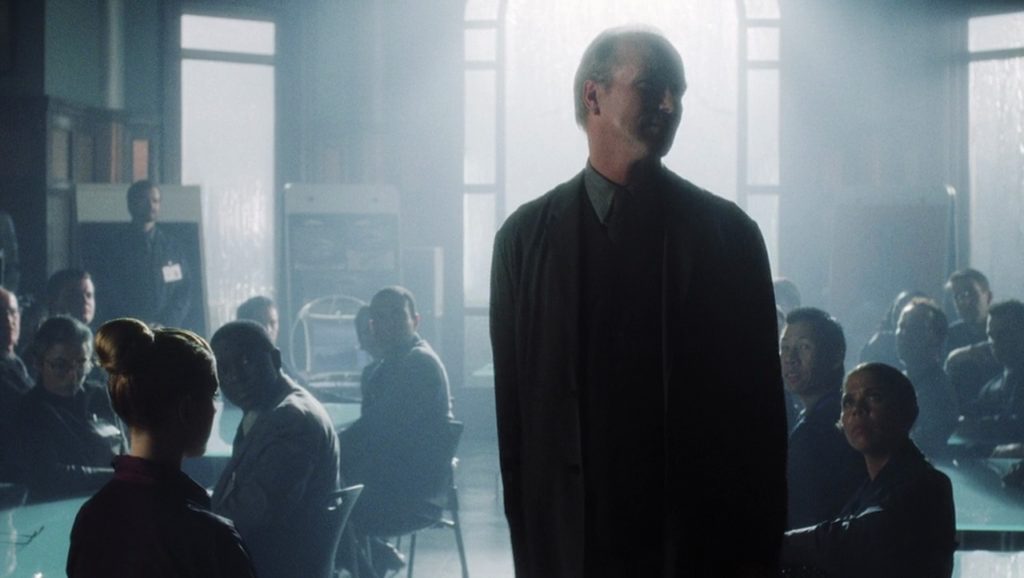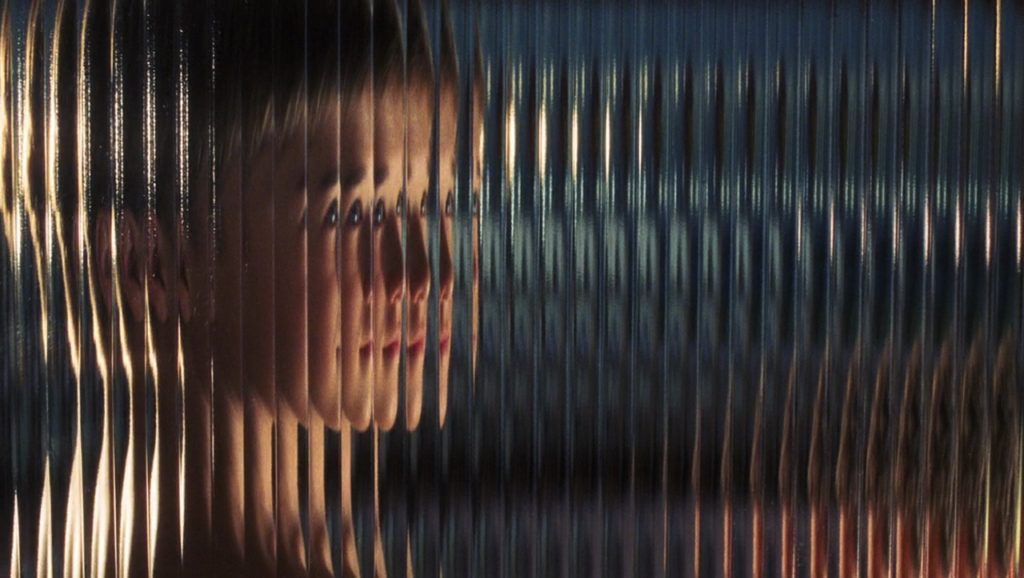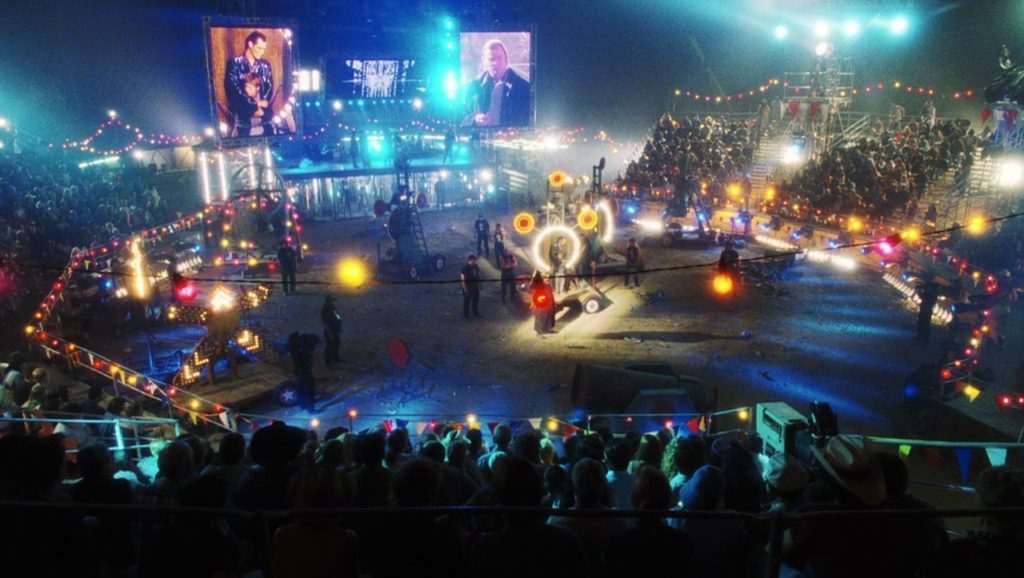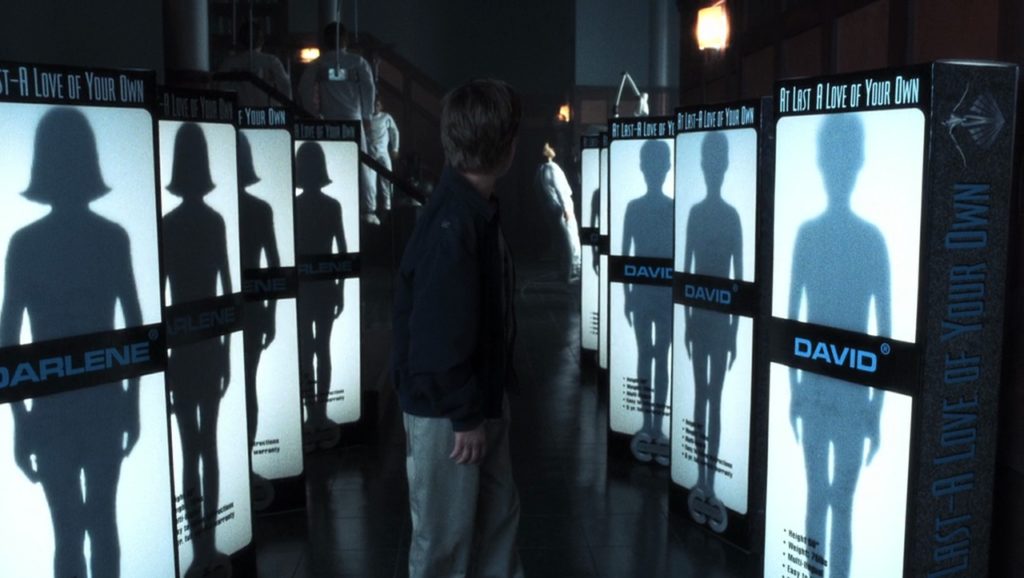You Can Always Get Another One: A.I. Artificial Intelligence
| Timothy Zila |

A.I. Artificial Intelligence plays at the Trylon Cinema from Sunday, January 15 through Tuesday, January 17. Visit trylon.org for tickets and more information.
“Those were the years after the ice caps had melted because of the greenhouse gases, and the oceans had risen to drown so many cities along all the shorelines of the world . . . Millions of people were displaced. Climates became chaotic . . . [Governments] introduced legal sanctions to strictly license pregnancies, which was why robots, who are never hungry and who did not consume resources beyond those of their first manufacture, were so essential an economic link in the chain mail of society.”
So goes the opening narration of Steven Spielberg’s A.I. Artificial Intelligence, set against a static shot of cresting and receding ocean waves. There’s no shore in sight. No civilization either. Just the ocean and its primordial waves. Just the memory of what once was, which is underwater now.
With its stark simplicity and its clearly outlined sense of cause and effect, this framing device has the feeling of a parable or a fairytale. Humans, the movie tells us, ruined the world with their over-consumption. And then, they created robots who don’t experience the same needs that humans do. What’s left unsaid is that these robots will outlive humans; they might even manage to exist when civilization drowns underwater as waves crash against the monumental architecture of the past.
The film unambiguously posits the emergence of robots (referred to as Mechas) as an evolutionary step for humankind. If man creates a Mecha in his own likeness, then man has become God—the oldest of sci-fi tropes, to be sure. This is the narrative pushed by Professor Hobby, portrayed by the great William Hurt. Hobby is one of only two real human characters in the film (the other one is Monica, the protagonist’s “mother”). Unsurprisingly for a Hurt character, he speaks in a tone that’s both confident and kind, though every word he utters is laced with sadness. The movie seemingly wants you to trust Hobby, though I find myself skeptical of Hobby’s motives. If robots were created to deal with the surfeit of resources, as the opening narration claims, then why are they produced en masse and abandoned the very moment they’re outdated? Why doesn’t sustainability seem to factor into the decision-making of the cybernetics industry?
Professor Hobby doesn’t seem particularly concerned about either the practicality or the morality of man’s consumption and excess. Or rather, he’s concerned with it only as it relates to what he thinks humankind’s crowning achievement should be: building robots with an inner life. Speaking to a large room of colleagues from Cybertronics of New Jersey, Hobby demonstrates the obvious drawbacks of current robots using a Mecha named Sheila. For one, they think very literally and mechanically. When asked what love is, Sheila responds by describing a series of physical responses to arousal rather than talking about love as an emotion or abstract idea. In place of the utilitarian Mechas that the company has previously produced, he proposes, they should “build a robot who can love . . . Love like the love of a child for its parents.”

This child is, of course, David. After the film’s prologue, the film almost never leaves his side. David is in every scene and nearly every frame from the moment Henry Swindon (played by Sam Robards) “surprises” his wife Monica (the luminous Frances O’Connor) by presenting her with a Mecha that is supposed to replace their son Martin, who’s in a coma.
Portrayed by Haley Joel Osment with an angelic, naïve sweetness that alternates between being cloying and sinister, David is the film’s raison d’etre. The philosophizing about artificial intelligence and the capacity for reason and love means nothing if those qualities aren’t embodied in a character. Haley Joel Osment embodies the character of David with gusto: nailing the balance between the familiar intensity of a young child and the sterile nature of a robot who, after all, has been designed and programmed for a purpose. That purpose, as Professor Hobby outlines, is love.
“A robot child who will genuinely love the parent or parents it imprints on with a love that will never end . . . You see, what I’m suggesting is that love will be the key by which they acquire a kind of subconscious never before achieved. An inner world of metaphor, of intuition, of self-motivated reasoning, of dreams.”
Professor Hobby speaks of David as if he’s the only Mecha who’s ever existed—as if he’s one of a kind. But the cold reality is David isn’t intended to be unique. David is a prototype. If he functions as intended (or close enough), he’ll enter mass production. Despite the film’s fascination with him, David is not special.

The key sequence of the film’s second act involves a Flesh Fair—a destruction derby-style event where Mechas are disemboweled in theatrical fashion. The film foregrounds the Flesh Fair as a cultural battleground—a place for disgruntled humans to vent their frustration with the Mechas who’ve taken their jobs. There’s a distinctly religious undertone to the event as well, illustrated by the words “Celebration of Life” emblazoned on the Flesh Fair’s sign. “Life” serves not as an affirmation here but as a term of exclusion: life excludes Mechas and lifeforms that are considered synthetic (as opposed to flesh, which is natural).
This religious element is what struck me most about the Flesh Fair when I first watched A.I. as a high schooler. Given my Evangelical upbringing, I was unsurprised at the prospect of humans displaying cruelty to robots in the name of “life.” What strikes me about the Flesh Fair now is not the obvious cruelty of the event, but the functional purpose it serves within the film’s society—waste disposal. A.I. doesn’t show us much about the cybernetics industry at large, but the Flesh Fair’s existence makes it clear it’s an industry that leaves behind a mass of discarded robots who no longer have a function to perform, and who must fend for themselves. The Flesh Fair discards of and eliminates the detritus of the Mecha industrial complex.
Robots may have been intended to function without actively consuming resources, but they themselves are resources embodied in synthetic flesh. And humans are not using them any differently than the technologies that preceded the economic disaster outlined at the beginning of the film. Humans have designed the Mechas to die, to become irrelevant, to be replaced. In a single phrase: planned obsolescence.

The conclusion of A.I. takes place at the “edge of the world,” in a New York City all but submerged by climate change. Professor Hobby lures David to his remote study, though it’s unclear why he does so. On a corporate level, David is a valuable piece of intellectual property, but Hobby seems to have little actual use for David once he arrives. Though he speaks of David in glowing phrases (as the incredible robot boy who learned to love), Hobby seems deeply out of touch and unempathetic. David’s reality has been crushed (the Blue Fairy is not real; his entire quest has been a fabrication), and all Hobby wants to talk about is how well his science experiment turned out. Any faint comfort Hobby offers David is undercut by what David finds as soon as he leaves the room: Countless versions of himself, placed into cute boxes and ready to be shipped to customers.
A.I. is mostly concerned with David’s spiritual and emotional nature—his capacity to love. But from a capitalist viewpoint all that is secondary. David is a product. His ability to love is just a selling point—a calculated result of the imprinting process where the product and the consumer create a bond.
The fact that David loved Monica—loved her relentlessly—merely means that Professor Hobby’s experiment worked. It’s of no consequence to him that Monica abandoned David—that she did not love him as he loved her. This outcome is presaged, indeed, in the film’s very first scene, where one of the Cybertronics employees tells Professor Hobby that it isn’t merely a matter of whether a robot can love a human, but whether you can “get a human to love them back?”
All that matters, in the end, is that the product is ready to ship. One of the last things Hobby says to David is that the team is “eager to meet him.” But if Hobby is telling the truth, and the team really is waiting nearby to meet him, they can’t be all that disappointed when they come into the room only to find that he’s disappeared. After all, there are a thousand more Mechas ready to take his place.
Ultimately, it isn’t with his creator that David finds comfort. It isn’t with the human race at all. David will wait a thousand years under the sea to encounter a lifeform that is neither human or Mecha—a lifeform whose interest in David is genuine and not driven by profit.
Edited by Olga Tchepikova-Treon
The post You Can Always Get Another One: A.I. Artificial Intelligence first appeared on Perisphere.
This content was originally published here.


